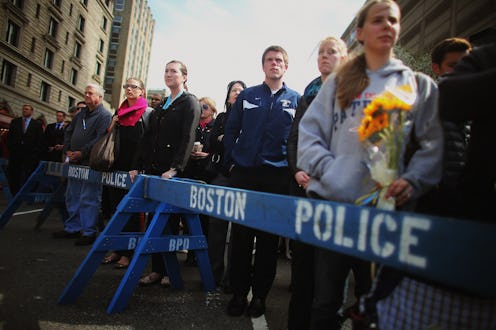News
Will the 24/7 News Cycle Give You PTSD?
A new study suggests that Post-Traumatic Stress Disorder can be transmitted via television images. Though the disorder has been on the psychiatric radar for over two decades, this is the first study to suggest that people outside the immediate impact zone of a traumatic event can suffer the same debilitating effects. According to the study, people who spent more than six hours a day watching coverage of the Boston Marathon bombings were more distressed than those who watched less TV.
Published in the PNAS journal, the study drew participants from Boston, New York City, and the rest of the country in exchange for free internet access. A month after the bombings, 4.5 percent of those surveyed met the criteria for "high acute stress." After adjusting for other factors, they found that a previous history of mental health issues or excessive viewing of the events on television (six hours or more) were most likely to be in that category. In fact, television viewing habits were more strongly associated with high acute stress than previous direct exposure to a similar event.
The 24/7 news cycle coverage of traumatic events, the researchers from the University of California, Irvine, warned, can "unintentionally spread negative impacts beyond the directly exposed area."
But the researchers acknowledge the limitations of the study, like that those who are most stressed out by unfolding events (and, perhaps, most predisposed to PTSD in the first place) are the likeliest to compulsively watch television coverage of such events in the first place.
"People who are most distressed in the aftermath of such an event are probably more likely to engage media coverage as a way of coping with the experience," they wrote. "Although this may be beneficial initially, over time the repeated media-based re-exposures may contribute to a self-perpetuating cycle of distress."
That's a good caveat to have. After all, fear if mass public PTSD shouldn't give any more fuel to the controversy over showing flag-draped coffins of service members returning home — nor should it deter coverage of war and violent conflicts. It's telling, perhaps, that exposure to the Sandy Hook shooting and the September 11th attacks influenced the participants in the study, but exposure to Hurricane Sandy did not. The violent nature of terrorism, as well as the specific targeting of civilians, seems to be of key importance.
But more importantly: if watching a few hours of graphic Boston Marathon coverage can give you PTSD-like symptoms, what do 12-hour weekend binges of violent video games do to you? I'm not someone who is big on censorship (children can handle almost anything, presented the right way), but do these findings warrant concern about a generation of children who have never even been to war growing up with PTSD?
Some soldiers report being more traumatized after playing games. Melissa Cramblett said that Call of Duty: Black Ops caused her to "think back to the realities of some of war's darkest moments." Then again, for others, the games can be a way of coping with their PTSD.
“Video game play may offer not only a type of training for learning to shoot targets or attend to peripheral cues in a dangerous environment, but also some inoculation to threats in nightmares,” said Jayne Gackenbach, the author of a study that looked at video games as a PTSD coping mechanism. “These dreams are the most common element of post traumatic stress due to trauma.”
This isn't to dismiss the new findings. Friends and family members of people who might be overly worried would do well to be cautious and limit their exposure to those graphic images. But perhaps the only thing that's known for certain about PTSD is that it's hard to figure out, and hard to treat.
